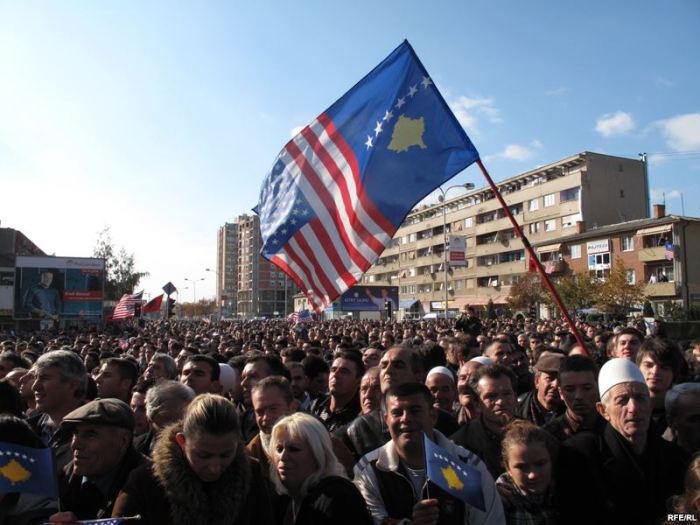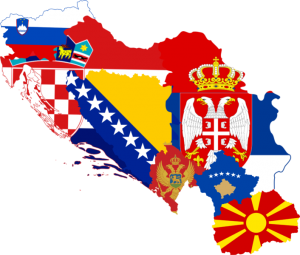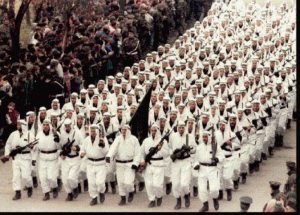
Views: 1001

A project for Greater Albania – conspiracy or legitimate? According to a 2010 Gallup Balkan Monitor report, 83% of Albanians in Albania supported the idea of a Greater Albania, with 81% and 53% of Albanians in Kosovo and North Macedonia respectively supporting such an ambition.
The ultimate goal? To have Kosovo and the Preševo Valley in Serbia, southern Montenegro, Epirus in Greece and western North Macedonia into a single Greater Albanian state. Although this may not be official policy of the Albanian Republic, it is ingrained into the Albanian mythos. The very idea of a Greater Albania has roots in the 1913 Treaty of London that left roughly 40% of the Albanian population outside the newly established Albanian country. This has been something that the U.S. could weaponize against Russian influence in the Balkans.
Despite the heroics of Albanian national figure and anti-Ottoman guerrilla leader Gjergj Kastrioti, more commonly known as Skënderbej, the Albanians became loyal Ottoman subjects and were used as colonists in more restive and disloyal areas of the empire, especially those inhabited by the Serbs, Bulgarians and Greeks. They often became a majority over the initial inhabitants, like what happened in Kosovo and western North Macedonia.
Although the idea of a Greater Albania may seem like an exaggerated conspiracy, to the Serbian people this is anything but. The Serbian mythos finds itself in the 1389 Battle of Kosovo, where despite their courage, Serbian Prince Lazar Hrebeljanović was martyred and his forces routed by the Ottoman invaders. Although the Serbs achieved sovereignty over Kosovo with the downfall of the Ottoman Empire, the region had already become an Albanian majority on Ottoman orders to weaken Serbian identity to the region.
Kosovo became an autonomous region of Serbia after the establishment of socialist Yugoslavia in the aftermath of World War Two and retained its Albanian-majority. The 1990’s proved this was always a weak point of Serbia. With the U.S. sponsoring the violent destruction of Yugoslavia in the early 1990’s, the status of Kosovo was left unresolved, culminating in the terrorist-led war against the Yugoslav state (in which Serbia was the successor of) in 1999.

The terrorist ethnic-Albanian Kosovo Liberation Army (KLA) had the backing of NATO and the Albanian Republic. The United Nations and NATO assumed control of the territory, which eventually declared independence in 2008. Since then the region has become a heroin ‘smugglers paradise,’ and a hub for human trafficking, organ harvesting and arms trafficking.
It is for this reason that in an interview on Saturday, the former Serbian Chief of General Staff, General Ljubisa Dikovic, discussed the project for a Greater Albania. Dikovic believes that the area of the Balkan Peninsula cannot be peaceful because of unresolved issues like Kosovo.
“There can easily be big problems if things get out of hand. I hope that there will be enough wisdom and intelligence and that everyone will do what we do, in terms of strengthening security, cooperation and trust. I am free to say that we are in the lead because I do not see on other sides showing desire to build peace. After all, the issue of ‘Greater Albania’ is a matter of the highest security risk. We can ask why this is happening now with Albania and [North] Macedonia? It might be waiting to create a ‘Greater Albania’,” Dikovic said.
His comments come as the economic situation in Kosovo continues to deteriorate and becomes even more reliant upon foreign aid and donations from the unilateral behaving U.S., their former Ottoman masters in Turkey that had gifted lands to them hundreds of years earlier, and Germany who effectively rules the European Union.
The former military man’s comments also come as Serbia leads Exercise “Slovenian Shield 2019” with Russia. Although some Slavic tribes broke off and headed south into the Balkans sometime at around 600AD, they maintained their Slavic kinship with the Russians and shared Christian Orthodox faith, ensuring Serbia has always had a pro-Russia view. Albanian expansionism has therefore become a natural ally of the U.S. to limit Russian influence in the Balkans.
However, this begs the question then why strong efforts for Albanian independence in Greece, Montenegro and North Macedonia has been weak in comparison to those in Serbia. Greece has been a long-time loyal NATO member, with the exception of the disintegration of Yugoslavia, and therefore does not pose a threat to U.S. hegemony in the Balkans, protecting Greece from destabilization efforts via Albanian expansionism. Although Montenegro and North Macedonia also share Slavic kinship with the Serbs and Russians, as well as the Orthodox faith, they have proven to have Globalist ambitions, wanting to join NATO and the EU.
Serbia remains the only anti-EU/NATO state in the Balkans that is overwhelmingly pro-Russia. It is for this reason that Dikovic wants to renew compulsory military service, stating: “One should not gamble and think that there will be no conflict and risk. It is not only up to us, but we must have an answer to everything.”
Although the overwhelming majority of Albanians want a Greater Albania, it is unlikely to be achieved with Washington’s backing in Greece, Montenegro and North Macedonia as they do not pose a threat to U.S. hegemony in the Balkans, but rather serve it, while not encouraging Russian influence in the region. As Serbia is a pro-Russian island in a hostile region, it will continue to be targeted by Albanian expansionism with U.S. backing. Will this drive for expansionism violently spill over into the Preševo Valley? That remains to be seen.

Originally published on 2019-10-28
About the author: Paul Antonopoulos is a Research Fellow at the Center for Syncretic Studies.
Source: BRICS Information Portal
Origins of images: Facebook, Twitter, Wikimedia, Wikipedia, Flickr, Google, Imageinjection, Public Domain & Pinterest.
Read our Disclaimer/Legal Statement!
Donate to Support Us
We would like to ask you to consider a small donation to help our team keep working. We accept no advertising and rely only on you, our readers, to keep us digging the truth on history, global politics and international relations.
[wpedon id=”4696″ align=”left”]









